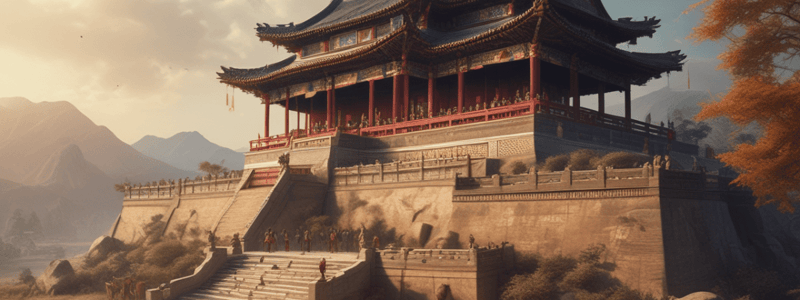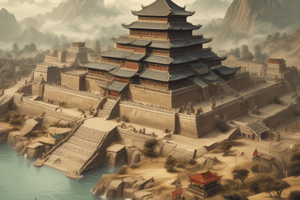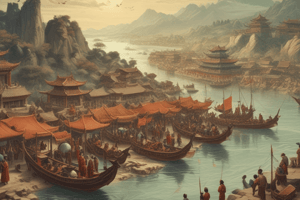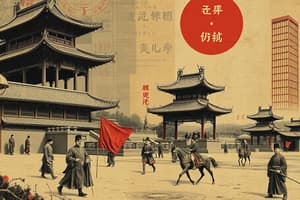Podcast
Questions and Answers
What marked the transition between the Bronze Age and the Iron Age in China's history during the Zhou Dynasty?
What marked the transition between the Bronze Age and the Iron Age in China's history during the Zhou Dynasty?
- The conquest of the Shang capital Anyang by King Wu of Zhou (correct)
- The social structure of the Zhou Dynasty
- The collapse of the Shang Dynasty
- The chaos following the collapse of the Shang Dynasty
What concept played a significant role in legitimizing the rule of later Zhou kings?
What concept played a significant role in legitimizing the rule of later Zhou kings?
- Social divisions
- Mandate of Heaven (correct)
- Rigid castes
- Divine intervention
What led to the victory of the Zhou Dynasty over the Shang Dynasty according to beliefs?
What led to the victory of the Zhou Dynasty over the Shang Dynasty according to beliefs?
- Strong central government
- Technological superiority
- Advanced military tactics
- Favor of the gods (correct)
Which social class in the Zhou Dynasty was responsible for trade and commerce?
Which social class in the Zhou Dynasty was responsible for trade and commerce?
Why was societal mobility limited in the Zhou Dynasty despite theoretical flexibility?
Why was societal mobility limited in the Zhou Dynasty despite theoretical flexibility?
What role did emperors play within their domains?
What role did emperors play within their domains?
How did memory production manifest during the Zhou Dynasty?
How did memory production manifest during the Zhou Dynasty?
What impact did new agricultural techniques have during the Zhou Dynasty?
What impact did new agricultural techniques have during the Zhou Dynasty?
How did trade contribute to the economy of the Zhou Dynasty?
How did trade contribute to the economy of the Zhou Dynasty?
What lasting legacy did the Zhou Dynasty leave on Chinese history and culture?
What lasting legacy did the Zhou Dynasty leave on Chinese history and culture?
Flashcards are hidden until you start studying
Study Notes
Zhou Dynasty
Introduction
The Zhou Dynasty, known as the Western Zhou (1046-771 BC) and the Eastern Zhou (770-256 BC), marked the transition between the Bronze Age and the Iron Age in China's history. Lasting approximately 700 years until the end of the Warring States Period, the Zhou Dynasty followed the chaos of the Shang Dynasty's collapse and ushered in a new era characterized by a strong central government and a hierarchical social structure.
Founding of the Zhou Dynasty
The Zhou Dynasty began with the conquest of the Shang capital Anyang in 1046 BC by King Wu of Zhou. The victory was attributed to divine intervention, as the gods favored the Zhou Dynasty, providing the new rulers with a mandate from Heaven (Tianming). This concept of the Mandate of Heaven would continue to play a significant role in legitimizing the rule of later Zhou kings.
Social Structure
Four Occupations
The society of the Zhou Dynasty was divided into four main social classes, each representing an occupation. These classes were commonly referred to as "the four occupations":
- Scholar-gentry (shi)
- Peasants (nóng)
- Artisans (gōng)
- Merchant traders (shāng)
These social divisions were based on the roles and duties performed by members of each class. Although theoretically flexible, societal mobility was limited due to the rigid nature of these castes, leading to a static population.
Emperors and Royalty
While the emperors were sovereigns and held ultimate power within their respective domains, they did not necessarily fit neatly into any of the four social classes. Instead, they occupied a separate space, symbolizing the embodiment of the Mandate of Heaven and serving as the spiritual leaders of their people. Their power extended beyond the limits of any single caste, as the emperors exercised their influence over all aspects of society.
Cultural Developments
Memory Production in China
During the Zhou Dynasty, the beginnings of cultural memory production emerged, influencing historical narratives for centuries to come. This memory production was reflected in the early literary works, such as the "Book of Poetry" and the "Classic of Documents," which were fundamental to later Chinese historiography.
Agricultural Practices
The Zhou Dynasty saw the adoption of new agricultural techniques and the expansion of agriculture throughout China. These developments led to the rise of a sedentary population and enabled the establishment of more organized states.
Trade and Exchange
Trade played a crucial role in the economy of the Zhou Dynasty. Domesticates like cattle and sheep were increasingly sourced from non-local areas, contributing to the growth of trade networks across different parts of China.
Conclusion
Despite the challenges faced by the Zhou Dynasty, such as internal conflicts and foreign invasions, it laid the groundwork for the emergence of a centralized empire in China. Its enduring legacy can still be seen today in various aspects of Chinese culture and history.
Studying That Suits You
Use AI to generate personalized quizzes and flashcards to suit your learning preferences.




